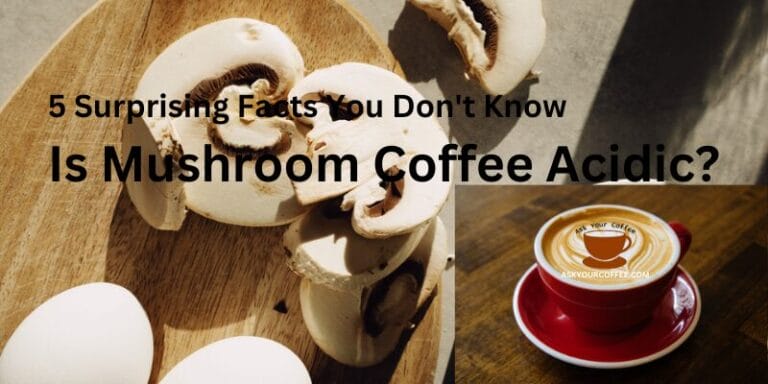Why does my coffee taste salty Top Causes and Solution
There’s nothing quite like that first sip of your morning coffee but you ever thought why does my coffee taste salty? It’s a puzzling experience that can leave you scratching your head and wondering what on earth went wrong.
Ever taken a sip of your coffee and thought, “Why does it taste salty?” It happens. It could be sneaky minerals in your water, residue in your gear, or even poor-quality beans crashing the flavor party. But fear not! Switch to filtered water, keep your coffee tools clean, and invest in top-notch beans. Your brew will thank you with a rich, pure taste. Cheers to a salty-free coffee journey!
Fear not, coffee enthusiasts! In this post, we’ll delve into the reasons behind this unusual phenomenon and, more importantly, how to restore your beloved cup of joe to its flavorful glory. Let’s Start.
Table of Contents
Understanding the Salty Surprise.
You’ve meticulously measured your coffee grounds, used fresh, high-quality beans, and brewed your coffee with precision. Yet, the result is far from the rich, aromatic flavor you were expecting – instead, you’re greeted with a surprising salty kick. What gives?
Read More: Why Does My Coffee Sizzle When I Adding Creamer?
Why Does My Coffee Taste Salty?
Here are some important factors that can make your coffee taste salty. I will discuss them and their possible solution to get a pleasant coffee experience.
1. High Mineral Content in Water.
Water, the silent player in your coffee game, can sometimes sabotage your brew with high mineral content.
Particularly, sodium can sneak into your cup, leaving a surprising salty note. It’s like an uninvited guest showing up at your coffee party, disrupting the harmony of flavors.
Understanding this starts with a closer look at your water. Tap water with high mineral content, known as hard water, can be a culprit.
The minerals, especially sodium, don’t just stay in the water; they hitch a ride into your coffee, altering its taste.
How to Fix It?
Use Filter/Bottled Water.
This is where the switch to filtered or bottled water becomes a crucial move. By doing so, you reduce the mineral content, ensuring a smoother, more flavorful cup of coffee.
If tap water is your only option, consider water softeners or regular descaling of your coffee maker to maintain the delicate balance of flavors in your brew.
2. Dirty Coffee Equipment.
Ever wondered why your coffee might taste a bit off? Your coffee maker and grinder might be harboring a secret – old coffee oils and residues.
These remnants from previous brews can linger in your coffee gadgets, becoming unexpected party crashers.
The issue lies in neglecting the cleanliness of your coffee-making tools. With each brew, oils, and residues accumulate, muddying the pure flavors you expect from your coffee. It’s like having a reunion of unwanted flavors right in your cup.
How to Fix It?
Regularly Clean Your Coffee Maker.
This is where embracing the role of a coffee hygiene enthusiast becomes crucial. Regularly clean your coffee maker, grinder, and any other coffee gadgets in use.
Consider a mix of water and vinegar for descaling – a spa day for your coffee equipment, ensuring a pristine environment for your coffee’s pure flavors to shine.
3. Poor-quality or Contaminated Coffee Beans:
At the heart of every good cup of coffee are the beans. Yet, poor-quality or contaminated beans can be the silent troublemakers in your coffee journey, whispering off-notes, maybe even a hint of saltiness.
Choosing the right beans is where it all begins. Poor-quality beans or those contaminated by improper storage can compromise the essence of your coffee. It’s akin to inviting unwelcome guests to your coffee celebration.
How to Fix It?
Choosing the Right Beans and Proper Storage.
Investing in fresh, high-quality beans is the first line of defense. Treat them with the respect they deserve, and store them in an airtight container, shielded from sunlight.
Moreover, ensure that your coffee-making tools are exclusive to coffee, preventing any cross-contamination that might alter the flavor profile of your brew.
4. Cross-contamination with Salt or Spices.
Ever felt like your coffee has a hint of spice or maybe even salt? If your grinder doubles as a spice grinder, you might be dealing with flavor crossover. Spices, particularly the salty ones, can leave a lingering imprint on your coffee.
The issue revolves around multitasking with your grinder. Using it for both coffee and spices blurs the lines between flavors, resulting in unexpected tastes in your coffee.
How to Fix It?
Use Grinder Only For Coffee Beans.
Solving this involves setting clear boundaries for your grinder. Designate it exclusively for coffee, ensuring it doesn’t play host to any spice residue.
If, by chance, you’ve experimented with grinding spices in your coffee grinder, thorough cleaning is the remedy to prevent unwanted flavor encounters in your cup.
5. The Coffee is Under Extracted.
Brewing coffee is a delicate dance of time and extraction. If the dance is cut short, you might find your coffee veering towards a taste that’s more sour than sweet, potentially even carrying a hint of saltiness.
The issue here is a misalignment in the extraction process. Under-extraction occurs when the water doesn’t spend enough time with the coffee grounds, leaving the flavors underdeveloped.
How to Fix It?
Proper Brewing.
Finding the right rhythm involves a bit of experimentation. Adjust your grind size and brewing time according to your chosen method, seeking the sweet spot where the flavors in your coffee can fully blossom. It’s about unlocking the potential of each bean for a well-balanced and delightful cup.
6. Salt Additions.
Sometimes, the salty note in your coffee is no mystery – it’s an intentional or perhaps accidental addition that went a bit overboard. It’s like your coffee decided to take a dip in the ocean.
How to Fix It?
Be Mindful.
The issue here is straightforward – too much salt. It’s essential to be mindful of your measurements and ensure any salt added is intentional and in moderation. Remember, you’re brewing coffee, not preparing soup.
7. Water Quality Changes.
Your tap water, like a chameleon, might change its taste, impacting the flavor of your coffee. Sudden shifts in water quality can be like changing the background music of your coffee party.
The issue lies in unexpected changes in your water source, affecting the delicate balance of your brew. Being attentive to these variations is crucial for maintaining consistency in your coffee flavor.
How to Fix It?
Check the Water Quality.
Staying informed about your water source is the key. If you notice any noticeable changes, consider using a water filter or adjusting your brewing process to accommodate the evolving personality of your water. Consistency in water quality leads to consistency in the flavor of your coffee.
The Bottom Line.
The mystery of a salty cup of coffee can be disheartening, but with a little detective work, you can reclaim the delightful flavors you love.
By addressing issues related to water quality, cleanliness, bean selection, cross-contamination, and brewing technique, you’ll be well on your way to enjoying the perfect cup of coffee once again.
Now I am sure you have a complete idea of Why Does My Coffee Taste Salty and How to Fix It.
Happy brewing!
Frequently Asked Questions – FAQs
Q: How do you fix salt in coffee?
A: If your coffee tastes salty, it might be due to high mineral content in your water, dirty equipment, or even poor-quality beans. Try using filtered water, regularly clean your coffee maker and grinder, and invest in fresh, high-quality beans. Experiment with adjusting your grind size and brewing time to find the right balance.
Q: Is salt in coffee good?
A: Surprisingly, yes! A tiny pinch of salt can enhance your coffee’s flavor by smoothing out its bitterness. It acts as a flavor enhancer, bringing out the natural sweetness. Just be cautious – a little goes a long way. Start with a small pinch and adjust to your liking.
Q: Does salt change the taste of coffee?
A: Yes, it does. Adding a pinch of salt to your coffee can balance out the flavors, making it taste smoother and less bitter. It’s like a secret ingredient that highlights the coffee’s natural sweetness. Just remember to keep it minimal; you don’t want your coffee to turn into a salt lick!
Q: What to do if espresso is salty?
A: If your espresso tastes salty, it might be over-extracted or the result of using high-mineral water. Adjust your grind size and brewing time to prevent over-extraction. Also, consider using filtered water to reduce mineral content. It’s all about finding that sweet spot for a perfect shot.
Q: Does Nescafe coffee contain salt?
A: Generally, Nescafe instant coffee does not contain added salt. However, always check the specific product label for accurate information. If you find a salty taste, it’s likely related to your water quality, equipment, or other factors. Experiment with different brewing methods and ensure your equipment is clean for the best flavor.







